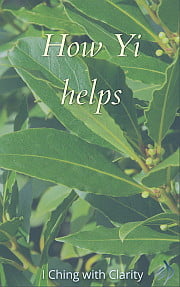
Writing lately about ways Yi helps reminded me of possibly my favourite chapter of the Dazhuan (the ‘Great Treatise’, 5th and 6th Wings of the Yijing):
‘Yi is a document that should not be set at a distance.
Its dao is ever-changing,
alternating and moving without rest,
flowing through the six vacant places,
moving up and down without rule.
Whole and broken lines change places,
with no consistent principle:
alternation is all that happens.
Going and coming within limits
gives warning without and within,
shedding light on trouble and its causes,
not as a guide or teacher, but like a parent at one’s side.
First study the statements,
and ponder their purport;
then principles will emerge;
but if one is not the person intended,
the dao will not apply automatically.’
This is quoted from Richard Rutt’s translation – which I appreciate because it lets you read through without interpolated commentary.
Rather like the ancient text of the oracle itself, I think this passage only looks like a set of unconnected statements, and has its own internal logic.
Yi is not to be set at a distance:
- it does not operate according to fixed rules – there is only change
- it’s not like an instructor or guardian, but like your father and mother
- and if you’re not ‘the person intended’, it does nothing
Those are three ways it can’t be set at a distance. To begin with, if Yi operated by fixed rules, you could use like a predictable tool that always behaves in the same way – like arithmetic, or a washing machine. It doesn’t, and so you must be close to it (or let it come close to you) to hear what it says.
Then it is ‘not like a teacher or guide‘ – which is quite startling, because we often do speak of Yi as if it were a teacher. Some even refer to what-speaks-through-Yi as ‘the Sage’. But… you are not close to a Sage: you follow their guidance and do what they say without question.
That’s an attitude to Yi I find disquieting: when someone says, ‘I wanted to do this, but Yi said not to, so I didn’t,’ I often feel there is something wrong. It’s odd in a way, because I trust Yi’s guidance absolutely in my own life. Yet it always seems important that it should at least be possible to have a conversation with Yi that goes like this:
‘How about doing this?’
‘It would be a trainwreck.’
‘OK. Thank you. I still feel it’s something I should do, so I’m doing it anyway.’
Paradoxically, I think this – reserving the right to our own trainwrecks – makes for a closer, more intimate relationship with Yi. If the Oracle becomes the arbiter of decisions, so that you automatically and without question do what it says, then you’re actually ‘setting it at a distance’ from your own intuition and moral sense.
The Dazhuan says Yi is not like a teacher but like ‘father and mother Nearing’ (the verb used is the name of Hexagram 19). Despite the cute illustration for this post, I don’t believe this means you have to be like a small child to Yi’s adult – however much it may feel like that at times! No – this is the relationship of an adult to their parents, or their parents’ spirits: made of love, respect and complete attention, but not knee-jerk obedience.
There’s a twist in the tail of this passage: first it tells you there are no rules or constant principles to Yi but change; then it says that if you study and reflect, ‘principles will emerge’ after all.
Wang Bi’s solution is to say that the ‘constant law’ you will find is change itself, which is an elegant interpretation. I have a feeling, though, that this may be following on from what was said earlier,
‘The Yi has no thought, no action. It is inert and motionless, but when activated it penetrates every cause under heaven.’
The Yi doesn’t have intrinsic principles; it has to be ‘activated’. When you pay attention to what it says and consider what it could mean – in other words, when you are considering your own reading – then ‘principles will emerge.’
Then the final line follows naturally: if you are ‘not the person intended’, in other words if this is not your reading and Yi is not speaking to you personally, then it does not apply.
The passage literally says something like, ‘If not its person, the dao does not act hollowly.’ I like Lynn’s translation: ‘the dao will not operate in vain.’ If you set the Oracle at a distance and treat understanding it as a theoretical exercise, then the dao cannot and does not engage with such emptiness: there is no reading, nothing happens. But if you let Yi be as close to you as a parent and reflect on what it’s saying to you, then it speaks.

 | How Yi Helps– an anthology. |
